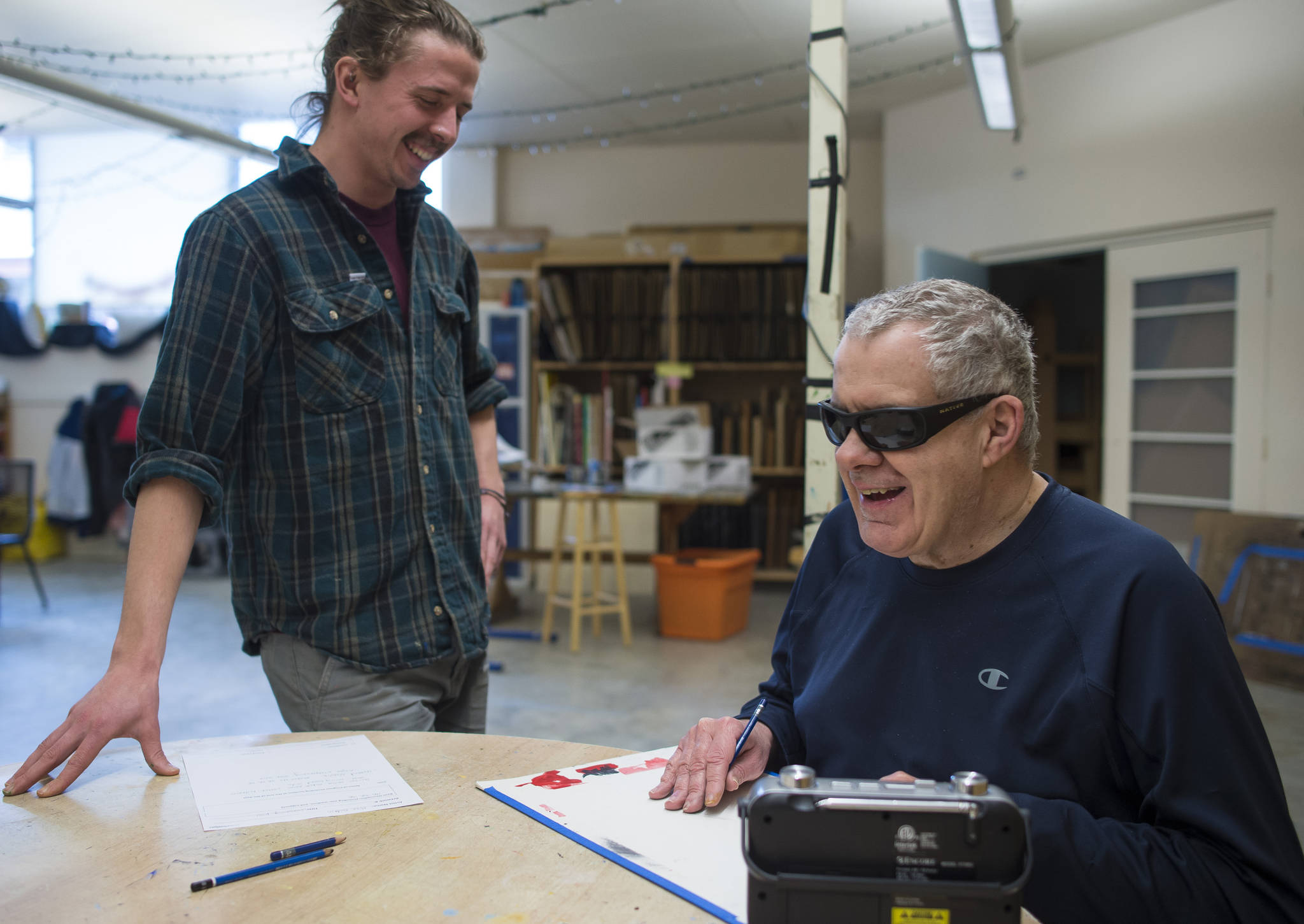It started in a church basement in 1977. Now, at 40 years old, the 300-employee REACH has offices in three Southeast communities, serving 400 individuals with developmental disabilities.
REACH, Juneau’s largest service agency for those born with developmental disabilities, will celebrate its 40th anniversary April 14.
The organization has grown from the brainchild of a group of local families — each looking to organize activities for their children — to one of Juneau’s largest private employers.
“We pretty much support people from birth through death in some cases,” Executive Director Millie Ryan said in a Tuesday phone interview.
Mike Godkin, 58, has been there through it all. His mother, Laurene Godkin, 81, helped found the agency. The mother-son duo has been some part of REACH since a group of like-minded parents met in a church basement in the 70s.
At work on a Tuesday afternoon, Mike answered the phones at REACH’s art studio The Canvas, which doubles as the agency’s community outreach arm. There, he works two hours a day, five days a week as a receptionist. He also spends two hours answering phones at the REACH offices around the corner.
“I answer the phones, I get the faxes. I make coffee in the morning. I also do stuff with my iPad, typing and stuff,” he said. “I take down reports when Mercedes (Gallery Director Mercedes Muñoz) has a report to give me. … It’s fun.”
One of the agency’s missions is to help those with disabilities find and keep employment. Look around the community and you’ll see REACH’s, well, reach: individuals served are grocery baggers, paper shredders, maintenance and custodial staff all around town.
After his paid shift is over, Mike works on passion projects in the afternoon, using The Canvas studio from 1-4 p.m. to draw. Though blind, his lack of sight doesn’t slow him down. He had a studio show in February at The Canvas.
“It feels good” to draw, Mike said. It helps him “express his feelings and focus more.”
Without REACH and support from his family, he said his days might be a little less colorful.
As a child, he attended a school for the blind in Vancouver, Washington, for 10 years. Then he worked on life skills at the Juneau School District’s Project Independence, or PI, as he calls it, housed at Floyd Dryden Middle School.
At some point, Laurene Godkin doesn’t remember when, Mike phased out of the PI program. They didn’t know what was next for him, she recalled. Employment opportunities for adults with developmental difficulties aren’t as wide as those without them.
Her son is “easy” to care for, Laurene Godkin said, so it wouldn’t have been an issue for him to be at home all the time. But getting out in the community with REACH — and finding paid employment, to boot — gives him a sense of purpose and independence he might not find if he spent that time at home, Laurene Godkin said. It might be a little harder for Mike to do as much as he does without REACH, which prioritizes getting those it serves out in the community, she said.
“We’re fortunate to have this program in Juneau,” Laurene said in a Tuesday phone interview. “That’s really important. I can remember way back when Mike was born, when he was little there weren’t any programs.”
Many of the organization’s founders have passed away, Laurene said, and she wasn’t a “real mover and shaker” with the founding group: she was busy with a career at the Alaska Legislature at the time.
But what she does remember is that a group of children like her son were going to phase out of the Juneau School District’s programs for the developmentally disabled. Their parents were wondering what would happen next for their children, each passing into adulthood.
So they started meeting in the basement of a local church.
“It was just a group of parents, we wanted something, a sheltered workshop, some type of program like that,” she said. “That was maybe the first program in REACH.”
The goal was to get productive work for the children. She didn’t imagine it would grow this big. REACH now has offices in Juneau, Haines and Petersburg and serves clients in Sitka, Hoonah, Skagway, Yakutat and Wrangell.
“I don’t think any of us visualized what a great program it turned into,” Laurene Godkin said.
What will the next 40 years bring? Ryan hopes technology will help more REACH clients live independently. Some of the people REACH serves find it hard to live alone safely, she said. The alternative could mean moving to a group home. Though that’s a preferred option for some, living independently is something REACH hopes as many people as possible can enjoy.
As technology develops and home systems become smarter, things like stove censors and remote video monitoring could allow service providers like REACH to more efficiently keep safe the people they serve. She’s already seeing technology make an impact in this area.
“We’ve been able to support a number of people to remain independent in their homes, and in a couple of cases it was looking like they would have needed more support, perhaps having to move to a group home,” Ryan said. “Now they are able to remain in their apartments, so we’re expanding beyond the home and looking at how to use technology to help people be more productive at work. We have a team of people piloting that.”
The 40th anniversary celebration is a chance for those who’ve been affected by REACH to share their stories. It will also double as a fundraiser for the organization.
“It’s a chance for some of the folks we serve to kind of tell their story and let folks know what they’ve been able to do in terms of working and living independently,” Ryan said.
• Contact reporter Kevin Gullufsen at 523-2228 and kgullufsen@juneauempire.com. Follow him on Twitter at @KevinGullufsen.

